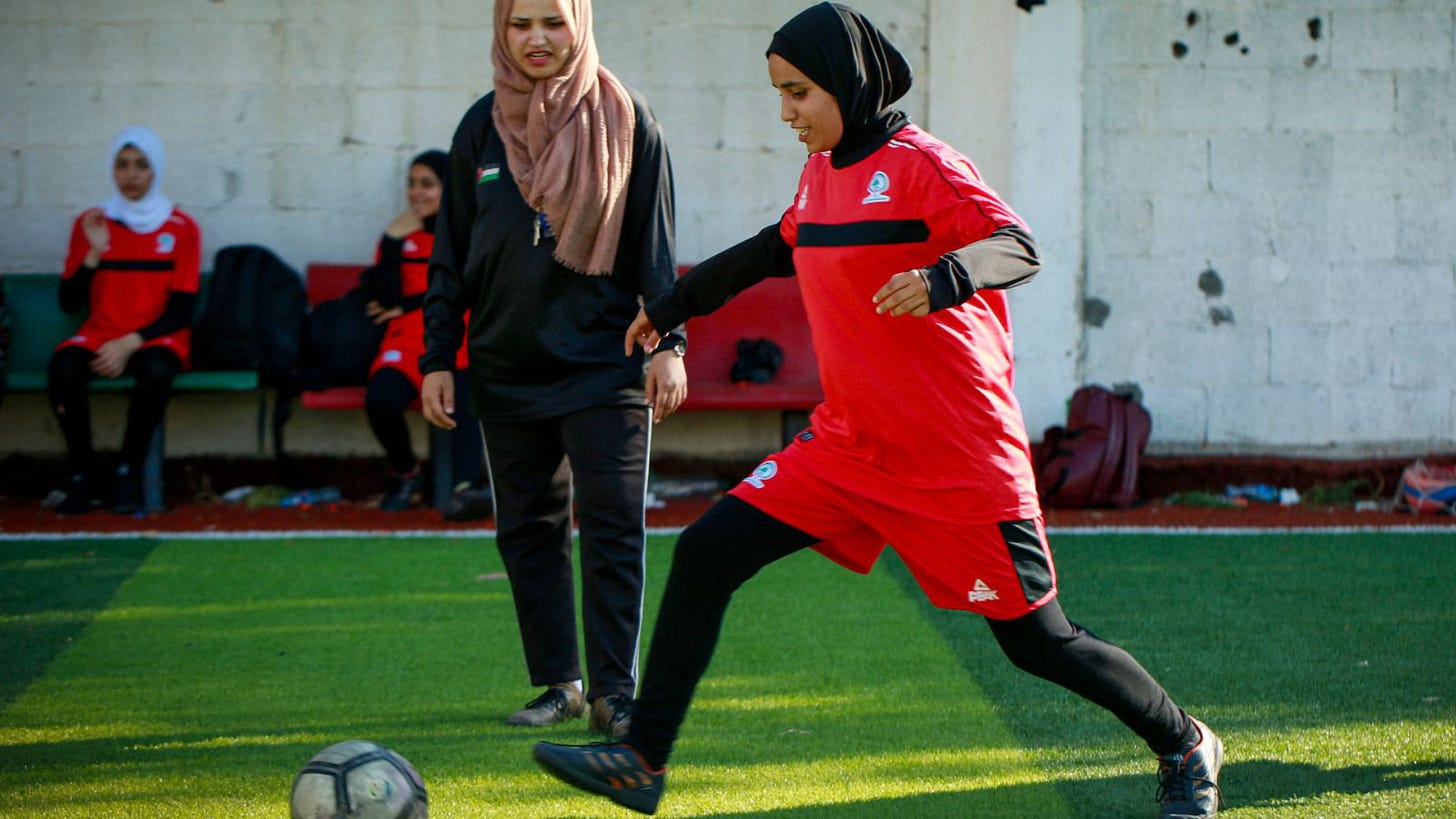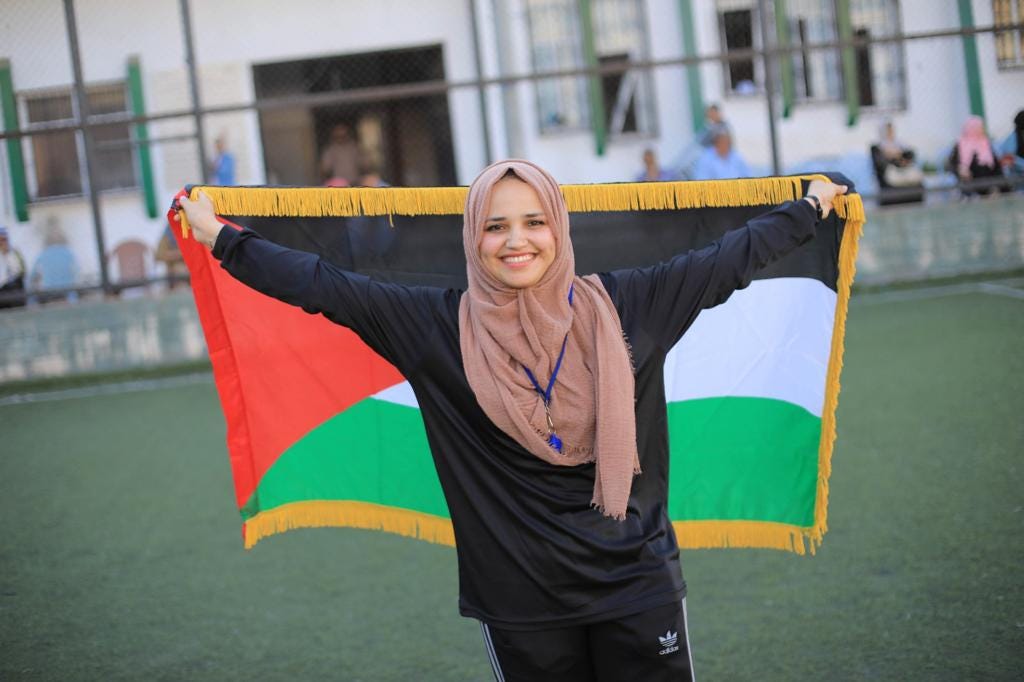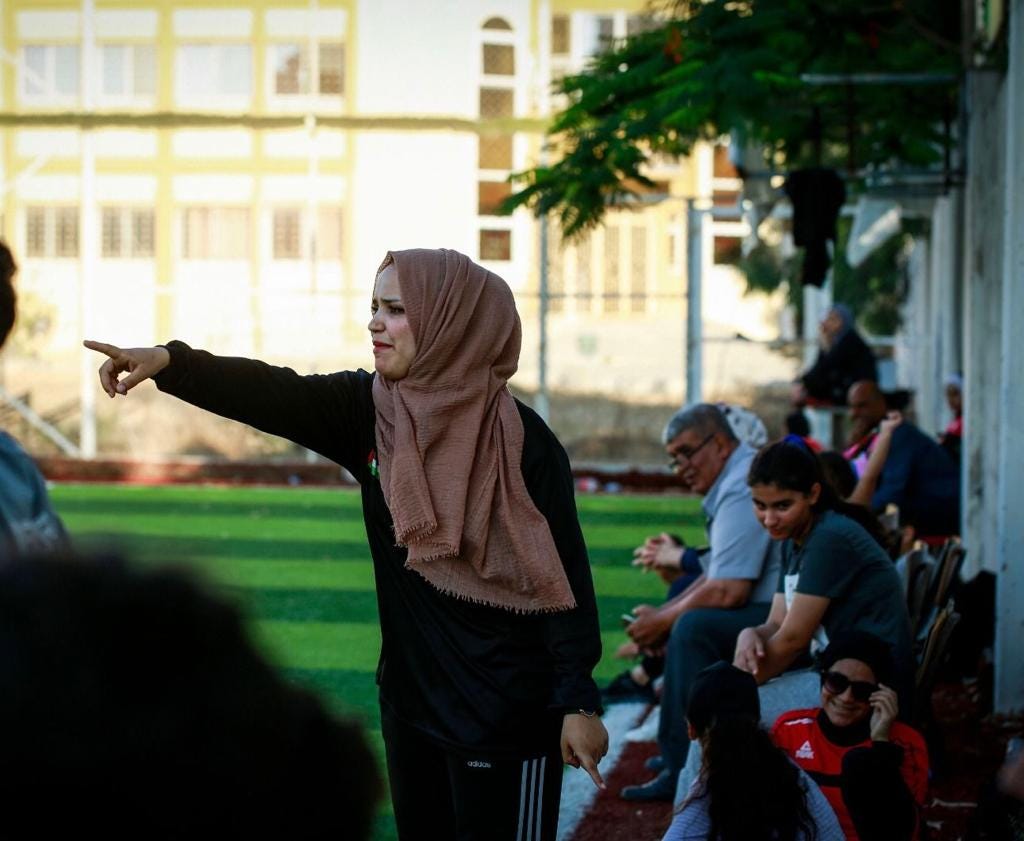Alaa-Al Amour and her girl’s football team tackle life under siege, scoring a taste of freedom while defying stereotypes.
For Alaa, 27, football is life. Growing up within a family of sports enthusiasts, Alaa’s love for the game was nurtured at home by her father, a retired coach, and her football-playing brothers.
"Until now, we have enjoyed watching football matches together, but my favourite time was playing football with them in our small backyard," she said.
As Alaa's passion for playing and training grew over the years, she wanted to join a club but she struggled to find one; football is considered a male sport in Gaza.
Historically, football and many other sports, like boxing and skateboarding, have not been popular among girls in Gaza, not only for the lack of suitable clubs and stadiums, but also as a result of the traditional societal expectations placed on females.
Alaa’s breakthrough was when her sister asked her to accompany her niece on the first day of joining football training at a project called PACES in 2017.
PACES, the Palestine Association for Children’s Encouragement of Sports, is a UK based-charity, with projects in Palestine, Jordan and Lebanon. It aims to provide a secure environment for Palestinian children aged 8-16 to participate in sports and essential life skills. It proudly maintains a 50% female participation rate.
“I was extremely happy to know about PACES and to meet girls with the same passion, even though they were younger than me,” she said.
The team started with 20 players, in addition to the coach and the coach's assistant. Unfortunately due to her age Alaa couldn’t join the team but when the assistant coach had to travel, the PACES administration already knew an excellent substitute; they offered the temporary position to Alaa!
“My happiness was greater than this world. I couldn’t believe that my dream of becoming a football coach - or at least an assistant - came true,” the passionate coach said.
Along with the training and family support workshops provided by PACES, Alaa enhanced her skills by reading books and watching videos about girls’ football training.
“The blockade has played a pivotal role in preventing partnerships and sports exchange programs, between players in Gaza and the rest of the world. Although we persevere and keep on.” She said.
Israel has placed Gaza under a suffocating blockade by land, air and sea since 2006. There are 2.4 million Palestinians living in Gaza today, one million of whom are children. According to Save the Children, 80% of Palestinian children suffer with depression.
A year later, the head coach was to be married abroad and there was no better standby coach than Alaa.
As a result of her training programmes, delivered with love and professionalism, the number of trainees has increased and many more girls in Gaza are finding empowerment and community in the beautiful game.
Soon, the number of girls who wanted to join Alaa's team quickly outgrew the project’s capacity. Alaa asked the director of Al-Mashtal, a local sports club in Gaza, if she and her team could use the stadium to train.
“The club allowed us to train for limited hours. I happily trained the girls for free as many could not pay the fees. Girls in Gaza deserve to play and enjoy their childhood, away from the stress and pressure of the strip, ” Alaa said proudly.
However, Alaa's passion alone was not enough to keep the ball rolling.
There is no football association for women in Gaza. Furthermore, all financial support is given to male players in a clear gender-discriminatory way. Naturally, the Occupation authorities also pull dirty tricks and foul play.
“I knocked on all the doors of the clubs and federations to support us by offering places or sports equipment and clothes. However, [most] ignore us.” Alaa said.
"Nevertheless, we challenged the community and smashed the stereotype that 'girls don't play football'. We believe sport is for everyone, regardless of gender."
Alaa noted that many people in Gaza have become more understanding and supportive of football for girls. Many people encourage their team to keep working, but she expresses serious concern for PACES’ financial situation.
In 2021, the amateur girls' team proved their talent and had the opportunity to participate in the Tokyo tournament, which took place in the West Bank.
Nonetheless, Israel intervened. While preparing her luggage the night before traveling, Alaa received a message from the Israeli government that she was rejected from traveling.
"My tears, uncontrollable, poured down my face. My sister calmed me down after I cried over our fate in Gaza. It was the most difficult moment of my life,” she said sadly.
According to Euro-Med Human Rights Monitor, Israel’s blockade constitutes an unprecedented form of collective punishment in a stark violation of international humanitarian law.
“I was glad that the other girls on the team could go with Mariam, my assistant coach."
Alaa couldn’t sleep that night. In the morning, she accompanied the girls to the Israeli-controlled and militarised Erez crossing. She consoled and reassured the girls, then discussed strategy and technique with Mariam.
Things turned from bad to worse, when the Israeli soldiers arbitrarily decided to deny Mariam's travel, too. Thus, the team had to travel with no coach and no assistant coach.
Palestinians are restricted en masse from leaving the Gaza the Strip, except in exceptional circumstances granted by Israeli occupation authorities. According to Save the Children, in the first half of 2023 Israel deprived life-saving healthcare to almost 400 Palestinian children in Gaza by denying their right to exit the Strip for medical care.
“Mariam and I hid our depression because the girls were already stressed. I contacted a friend working at the sports federation in the West Bank to take care of them, and she was so helpful,” the 27-year-old said.
“I am wondering when Palestinians can travel freely without being rejected for no reason.”
The girls kept in touch with Alaa via video calls, they called her from the Al-Aqsa mosque in Jerusalem where she dreams to visit one day.
The girls played hard to win the tournament and the challenge of proving their right to sport. When they returned to Gaza they continued their training and participated in other international tournaments.
In 2022, the football team traveled to Europe to participate in football tournaments in Norway, Denmark, and Jordan. Alaa, luckily, was allowed to pass peacefully via Erez with the team at that time.
“For most of the girls, it was their first time traveling to Europe; we felt strange seeing many new things that do not exist in Gaza. We learned new cultures and loved how much solidarity we received from people when we spoke about Palestine,” Alaa said smiling.
“No words can describe the feeling of representing Palestine through sport. We won most of the matches but our biggest win was not normalising the violence and oppression in Gaza and proving that we don't quit.
Alaa believes the violation of rights in Gaza - freedom of movement, the right to a life without violence, the right to life itself, to play sports, to grow up without trauma - are powerful reasons to fight for a better life full of peace and bright dreams.
“Challenges make us stronger. We are undefeated and nothing can destroy our hope, because we believe we deserve the best,” she said.
In the future, Alaa hopes to travel to Spain, to watch Barcelona play and meet Messi, her favourite international player. But, Alaa’s biggest dream of all is to open a girls’ football academy in Gaza and join world football championships. With societal and financial hurdles to overcome, only time will tell if Alaa realises her dreams.








